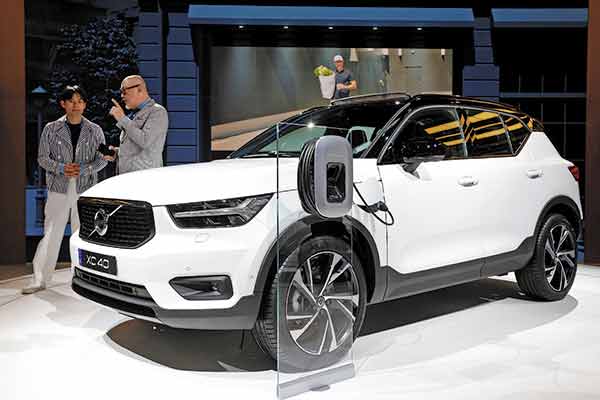Car manufacturers jostle for supremacy in expanding electric mobility segment
By Hao Yan and Li Fusheng | China Daily | Updated: 2018-04-28 09:38

Rivals prepare for fierce market competition as latest new energy vehicles take center stage at Auto China 2018
International carmakers announced their bold moves towards an electric mobility future and Chinese startups unveiled their latest fully-electric models at Auto China 2018 in Beijing this week.
The moves were led by Volvo Car Group which announced it will have fully electric cars contribute towards half of its annual sales volume in 2025. The Swedish carmaker displayed only electrified models at its booth at the auto show.
Volvo said the other half of its sales will come from hybrid models, including plug-in hybrid and 48-volt mild hybrid, reaffirming the manufacturer's pledge that it will only introduce electrified models after 2019.
"We have launched all out electric models, and the next step is to work on the improvement of the next generation electric drivetrain on our second generation Scalable Platform Architecture," said Hakan Samuelsson, president and CEO of Volvo Cars, said in an interview with China Daily.
Volvo Cars' all-new XC40 plug-in hybrid model made its world premiere at the auto show in Beijing, showcasing the company's ambition for transformation in the world's largest car market.
Another premium auto maker pinning high hopes on the Chinese electric vehicle market is BMW Automotive Group, which announced its local production plan for its BMW iX3 fully-electric model at its manufacturing base in Shenyang, Liaoning by 2020.
The German carmaker said it will localize its purely electric concept, the BMW iX3, in China by 2020. The model also made its global debut at Auto China.
"The launch of the first fully-electric core model of BMW here in China, not in Germany, sends a message that we are optimistic, we are believing in Chinese market, and we are committed to China," said Harald Krueger, chairman of the board of management of BMW AG.
BMW AG said it will also defend its No 1 position in China's premium e-mobility market and announced plans to further enrich its electrified lineup in China.
BMW currently sells six electrified models in China, including two produced by its Chinese joint venture BMW Brilliance, which will manufacture the forthcoming iX3. The sales volume of BMW electric models grew by more than 400 percent in the Chinese market in the first quarter this year.
Volkswagen Group will begin its local production of battery-electric cars in at least six factories by 2021, according to Herbert Diess, CEO of Volkswagen Group.
In the next seven to eight years, Volkswagen will offer 40 new energy vehicle models produced in China under the group's Roadmap E strategy, which the company claims is the world's most comprehensive electric vehicle offensive.
"Cells for our electric cars in China will-of course-come from China. The contracts with our first local supplier have been signed," Diess said.
In the race for the international auto makers' electric car localization, product positioning will play a key role in deciding their future, according to John Shen, Accenture Strategy Greater China managing director.
"The right positioning is the carmaker's crucial business judgment to be made. We will wait and see which will be the right choice," Shen said. He said that high-end sports car manufacturers are keen to show their green credentials, in conjunction with others that are more focused on reducing the costs of electric vehicles.
It's not just overseas automakers that are honing in on e-mobility, a raft of Chinese startups have also come to the fore to offer their own local solutions.
Nio, a Chinese startup based in Shanghai, is on the verge of delivering its first batch of ES8 fully-electric sport utility vehicles to customers this year, while domestic carmakers Xiaopeng and WeltMeister are accepting pre-orders for their models to be delivered this year as well.
Byton and State-owned car manufacturer FAW Group have entered into a partnership and their first industrial prototype is in the process of assembly at Byton's Nanjing manufacturing base.
"Conventional carmakers have technology strengths in some perspectives, but won't strive to push as hard as the new comers," Shen said.
"On the other hand, younger players have a stronger impulse to be revolutionary. Because, to them, the more revolutionary the better chance to stir the current market pattern."
























